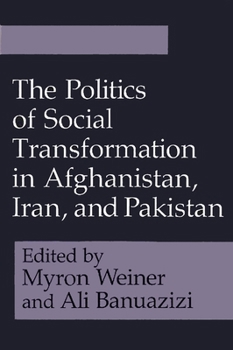The Politics of Social Transformation in Afghanistan, Iran, and Pakistan
Select Format
Select Condition 
Book Overview
This volume comprises the work of some of the leading authorities in Southwest Asian and Middle Eastern studies concerning the state-initiated interventions to restructure the socio-political order in Afghanistan, Iran and Pakistan.
Format:Paperback
Language:English
ISBN:0815626096
ISBN13:9780815626091
Release Date:March 1994
Publisher:Syracuse University Press
Length:502 Pages
Weight:1.55 lbs.
Dimensions:1.1" x 6.0" x 8.9"
Customer Reviews
1 rating
A SUPERB ACADEMIC WORK COVERING THE NON-ARAB MIDEAST
Published by Thriftbooks.com User , 26 years ago
It is not easy to draw parallels between nations with similar histories or backgrounds. The mosaic of mankind creates variations that are not limited by borders or even categorizations. The three nations discussed share things in common: they all speak Indo-European languages (albeit altered due to Semitic influences); a common religious background (Islam predominates, but Iran is predominantly Shi'i or Shi'a); and historical currents that separate and unite the three nations. Iran, Afghanistan, and western Pakistan all belong to a greater Persian civilization (which expands to include the Kurds in the west) that has adapted to Islamic conversion in different ways. All three nations have had to deal with dismemberment by sea-faring and land-faring expansionist nations from Europe and herein lies the differences. Iran has developed the most literate and socially advanced society of the three, but lacks the social and political freedom found in British-influenced Pakistan. Pakistan has had to adapt as a new nation with an ancient past as a crossroads of civilization (primarily Indo-Iranian) and contentious neighbors (notably India). Afghanistan has been ravaged by wars since ancient times, but remains a strategically vital country. Ethnic politics further confuse the issues both within and without these states. All share cross-border ethnic groups such the Pashtuns (the largest group in Afghanistan and 2nd largest in Pakistan), Farsiwans (Iranian Shi'is found in Afghanistan), Baluchis (living in Iran and Pakistan as well as Afghanistan), and groups that border nations outside the area of this collection of monographs (such as Kurds in Iran, Tajiks and various Turks in Afghanistan, and Panjabis and Kashmiris in Pakistan). The attempts to create monolithic societies in such countries is often futile and difficult to establish. The issue at hand in this work is to analyze the societies, politics, and also the histories of these nations and the divergent paths they have all taken. This is a prodigious task that is tackled with vigor and the result is a one of a kind work on a region of the Near East that is not fully understood by the rest of the world.





